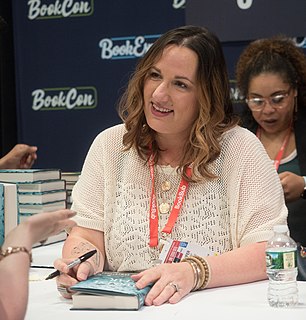A Quote by Joseph Campbell
When you go through life ... it all seems accidental at the time it is happening. Then when you get on in your 60s or 70s and look back, your life looks like a well-planned novel with a coherent theme ... Incidents that seemed accidental, pure chance, turn out to be major elements in the structuring of this novel. Schopenhauer says, 'Who wrote this novel? You did.'
Related Quotes
You know, there’s a philosopher who says, “As you live your life, it appears to be anarchy and chaos, and random events, non-related events, smashing into each other and causing this situation or that situation, and then, this happens, and it’s overwhelming, and it just looks like what in the world is going on ? And later, when you look back at it, it looks like a finely crafted novel. But at the time, it don’t.
Well, people have been wondering what's going to happen to the novel for two hundred years; its death has been announced many times. You know, I think the novel keeps redefining the world we live in. What you should look for in a novel is a window nobody else is looking out of, that nobody else can look through. What you look for is a voice. You pick up a novel by someone such as Faulkner or Hemingway and you just read three pages and you know who wrote it. And that's what one should demand of a novelist.
The point is, that the function of the novel seems to be changing; it has become an outpost of journalism; we read novels for information about areas of life we don't know - Nigeria, South Africa, the American army, a coal-mining village, coteries in Chelsea, etc. We read to find out what is going on. One novel in five hundred or a thousand has the quality a novel should have to make it a novel - the quality of philosophy.
Remember remain alert that you don't get too much attached to the accidental - and all is accidental except your consciousness. Except your awareness, all is accidental. Pain and pleasure, success and failure, fame and defamation - all is accidental. Only your witnessing consciousness is essential. Stick to it! Get more and more rooted in it. And don't spread your attachment to worldly things.
No writer, I believe, should attempt a novel before he is thirty, and not then unless he has been hopelessly and helplessly involved in life. For the writer who goes out to find material for a novel, as a fishermen goes out to sea to fish, will certainly not write a good novel. Life has to be lived thoughtlessly, unconsciously, at full tilt and for no purpose except its own sake before it becomes, eventually, good material for a novel.
If I can give a young author any advice, whatsoever, never let anyone announce the film sale of your first novel. Film rights are sold to almost every novel, but it shouldn't be the lead story in your first engagement with the press. Then you end up getting reviews like "a novel made for the screen" and things like that.


































